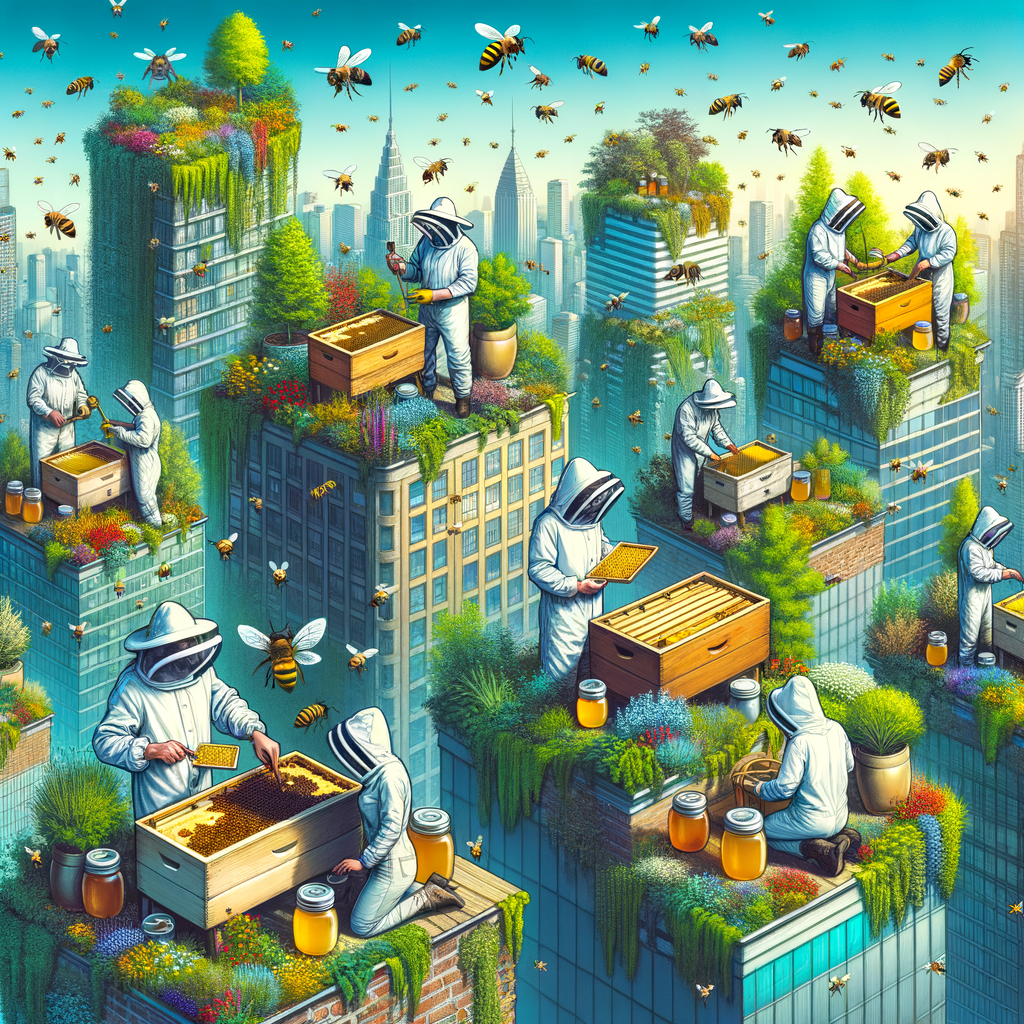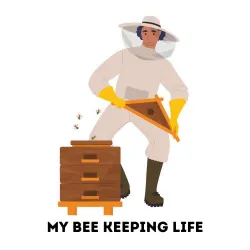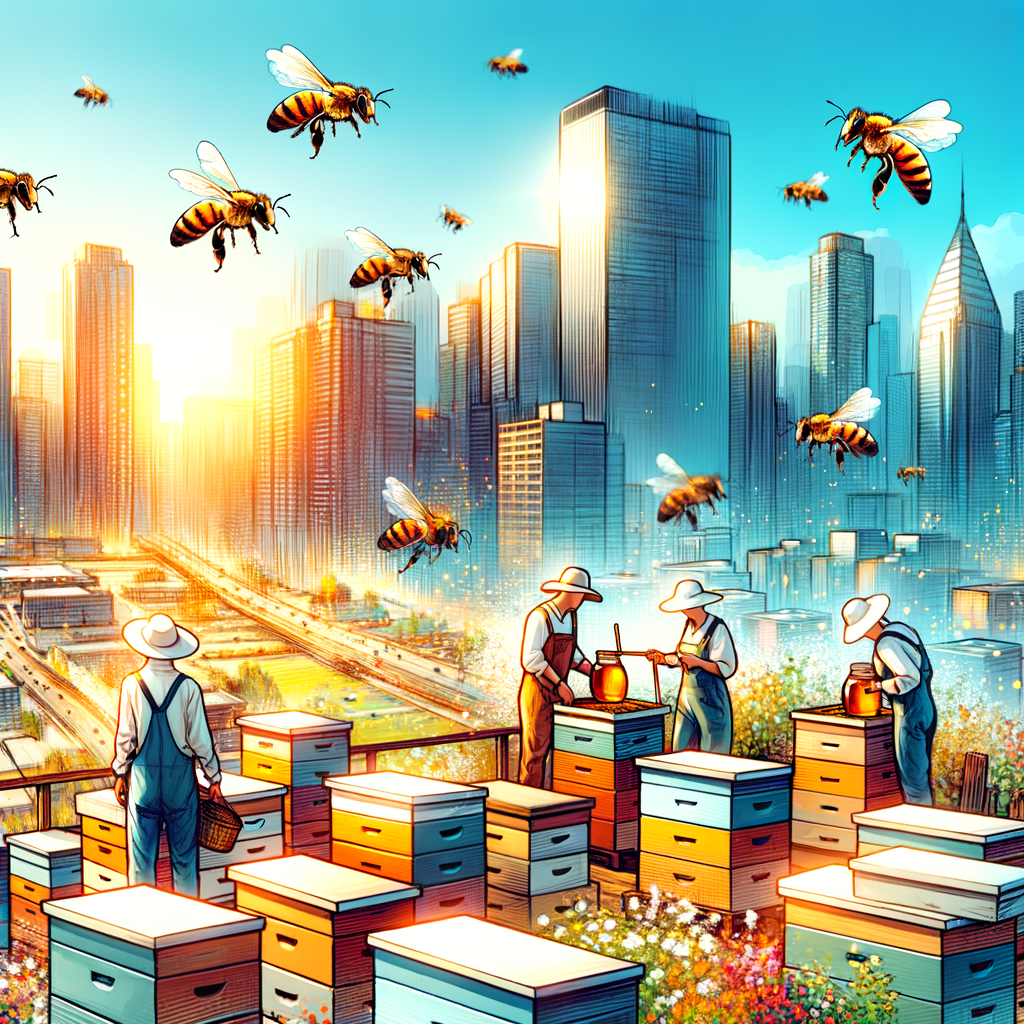
Introduction to Urban Beekeeping
Urban beekeeping is a fascinating and increasingly popular hobby that is not only enjoyable but also beneficial to our environment. In this article, we will explore the concept of urban beekeeping and its importance.
-
- Definition of Urban Beekeeping
Urban beekeeping, also known as city or backyard beekeeping, is the practice of keeping bee colonies in urban areas. This can be done in a backyard, on a rooftop, or even on a balcony. The goal is to produce honey, beeswax, and other products, but urban beekeepers also play a crucial role in supporting the local ecosystem by promoting pollination.
-
- Importance of Urban Beekeeping
Urban beekeeping is important for several reasons. Firstly, it helps to increase the population of bees, which are essential for pollination and therefore for the growth of fruits, vegetables, and flowers. Secondly, it allows for the production of local honey, which can have health benefits and is a sustainable alternative to mass-produced honey. Lastly, urban beekeeping can help to educate people about the importance of bees to our ecosystem, and can be a rewarding and engaging hobby.
Now that we have introduced the concept of urban beekeeping and its importance, let’s delve deeper into the benefits of this practice in the next section.
Benefits of Urban Beekeeping
Urban beekeeping is a growing trend that offers numerous benefits. One of the most significant advantages is the production of urban honey. Let’s delve into the details.
Urban Honey Production
Urban honey is a unique product of city-based beekeeping. It’s a sweet, natural substance made by bees that gather nectar from a variety of flowers in urban areas. This honey has several benefits and has been successfully produced in various cities worldwide.
-
- Benefits of Urban Honey
Urban honey is not just delicious; it also has several health benefits. It’s rich in antioxidants, which can help to protect your body from cell damage due to free radicals. Urban honey is also a healthier alternative to refined sugar, making it an excellent choice for those looking to maintain a balanced diet. Furthermore, local honey can help to alleviate seasonal allergies, as it contains small amounts of pollen picked up by bees from local plants.
-
- Case Study: Successful Urban Honey Production
One successful example of urban honey production is the case of New York City. Despite being one of the world’s busiest metropolises, it has a thriving urban beekeeping scene. The city’s beekeepers have managed to produce high-quality honey in the heart of the city, demonstrating that urban beekeeping can be both feasible and profitable. The honey produced in New York City is unique, reflecting the diverse range of flowers found in the city’s parks and gardens.
Urban honey production is a significant benefit of urban beekeeping. It provides a healthier alternative to refined sugars, can help alleviate allergies, and offers a unique taste that reflects the local flora. Plus, as seen in New York City, it can be a successful and profitable venture.
Urban Beekeeping and Biodiversity
- Role of Bees in Biodiversity: Bees play a crucial role in biodiversity by pollinating plants, which helps in the growth of fruits and vegetables. They are a key part of our ecosystem, helping to maintain the balance of nature.
- Impact of Urban Beekeeping on Biodiversity: Urban beekeeping can have a positive impact on biodiversity. It increases the number of pollinators in the city, which can lead to an increase in the variety of plants.
- Bees and Pollination: Bees are one of the most effective pollinators. They transfer pollen from the male parts of a flower to the female parts, allowing plants to produce fruit and seeds.
- Bees and Ecosystem Health: Bees contribute to the health of ecosystems by pollinating plants, which provide food and habitat for other wildlife. Without bees, many plants would struggle to reproduce.
- Potential Negative Impacts: While urban beekeeping has many benefits, it can also have negative impacts. For example, if not managed properly, bees can become a nuisance to people living nearby.
- Strategies for Mitigation: To mitigate potential negative impacts, urban beekeepers should ensure they manage their hives responsibly. This includes providing adequate space for the bees and ensuring they do not become a nuisance to neighbors.
- Common Challenges in Urban Beekeeping: Urban beekeepers may face challenges such as limited space, potential conflicts with neighbors, and the need to navigate city regulations.
- Solutions and Best Practices: To overcome these challenges, urban beekeepers can use rooftop spaces, communicate with neighbors about their beekeeping activities, and ensure they comply with all city regulations.
- Benefits of Beekeeping for Urban Agriculture: Beekeeping can benefit urban agriculture by increasing pollination, which can lead to higher yields of fruits and vegetables.
- Case Study: Beekeeping in Urban Agriculture: In New York City, urban beekeepers have successfully used rooftop spaces to keep bees, contributing to the city’s biodiversity and urban agriculture.
- Practices for Sustainable Urban Beekeeping: Sustainable practices include using organic methods, providing bees with a diverse range of flowers for foraging, and managing hives responsibly to prevent disease.
- Impact of Sustainable Beekeeping Practices on Urban Ecosystems: Sustainable beekeeping practices can enhance urban ecosystems by increasing biodiversity and improving the health of plants and other wildlife.
- How Beekeeping Contributes to Urban Ecosystems: Beekeeping contributes to urban ecosystems by increasing the number of pollinators, which can enhance plant diversity and provide food for other wildlife.
- Key Takeaways: Beekeeping’s Role in Urban Ecosystems: Beekeeping plays a crucial role in urban ecosystems by increasing biodiversity, supporting plant health, and contributing to urban agriculture.
- Current Trends in Urban Beekeeping: Current trends in urban beekeeping include the use of rooftop spaces, community beekeeping projects, and the use of sustainable practices.
- Future Prospects for Urban Beekeeping: The future of urban beekeeping looks promising, with increasing interest in sustainable practices and the potential for urban beekeeping to contribute to city biodiversity and food production.








